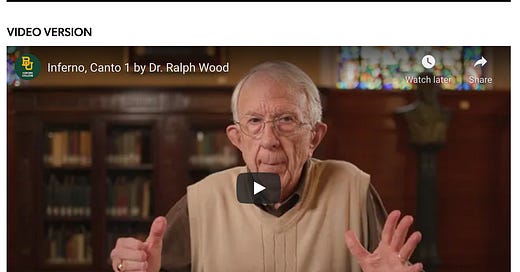If I could rewrite Oh the Places You’ll Go, I’d draw that little tyke with a handful of loved ones around him on his way. Chaucer and Dante told truer tales of pilgrimage. I’d also forego many of Theodor Geisel’s words in favor of those T.S. Eliot wrote: ‘We shall not cease from exploration/ and the end of all our exploring/ will be to arrive where we started/ and know the place for the first time.’ Read the rest here.
In lieu of graduation in 2020, when students were all sent home because of the pandemic, Law & Liberty asked a handful of people to pen graduation speeches for students. I remembered these words that I wrote then because hundreds of us are experiencing the metaphor of pilgrimage as we read through Dante’s The Divine Comedy over the next 100 Days in the largest reading group ever, cohosted with University of Dallas, Biola University’s Torrey Honors, and Baylor University. The first videos were released recently, so you still have time to join and catch up.
When I teach The Divine Comedy, I consider the journey one of the pilgrim’s education. Dante learns the difference between liberty and license as he descends into hell, where the sinners are enslaved by their own passions. They were free to choose even what would imprison them. As Dante reaches the summit of Mount Purgatory (spoiler alert), he is crowned and mitered lord of himself. His pilgrimage has transformed him to become truly free.
As we celebrate the 700th anniversary of Dante’s death this year, you will find so much on Dante out there. New books, new translations, podcasts, webinars. Here are just a handful of resources to enjoy:
Beatrice Institute hosted a conversation with Jason Baxter, author of A Beginner’s Guide to The Divine Comedy
The legendary Robert Hollander, translator and Dante scholar, who passed away in June 2021, gave a lecture “The Scandal of Dante’s Catholicism” at the University of Dallas that is worth watching
Jennifer Frey and Matthew Rothhaus Moser discussed all of the Divine Comedy over three episodes of The Sacred and Profane Love podcast
the University of Notre Dame published a book by Dennis Looney Freedom Readers: The African-American Reception of Dante
And, for teachers, my friend Jennifer Holberg edited a two special issues of Pedagogy (13 and 17) on how to teach Dante well
Randy Boyagoda aptly titled his new novel Dante’s Indiana; read this review “Finding Dante in the Infernal Midwest” if want to know more
of course, there’s a thousand more!
For pilgrims like Dante, the virtue of hope becomes all important. It is the wayfarer’s virtue. On our Arts of Liberty site, we guide learners and teachers through what these virtues mean and how they appear in various texts throughout the tradition, including in Dante’s Commedia. St. Thomas Aquinas defines hope as “the virtue by which a person attains proper measure in his or her deeds, hoping for a difficult but attainable good, attainable only through the help of God” (Summa Theologiae, IIa.IIae, question 17). I invite you to read some of our other articles that explore what hope means to Socrates, Sir Thomas More, or Winston Churchill. In Winter 2020 Evangelization & Culture, the journal produced by Word on Fire, dedicated a special issue to Hope, in which I contributed a reflection on Dante’s Commedia. I’d recommend you grab a copy.
We are all pilgrims on this journey, and I am so grateful to have a broad company with whom to sojourn. We welcome your contributions to this conversation. If you would like to send me further examples of where hope sings loudly in great texts (art, music, literature, film), I would love to share them.
“Do not get lost in a sea of despair. Be hopeful, be optimistic. Our struggle is not the struggle of a day, a week, a month, or a year, it is the struggle of a lifetime.” --John Lewis,






